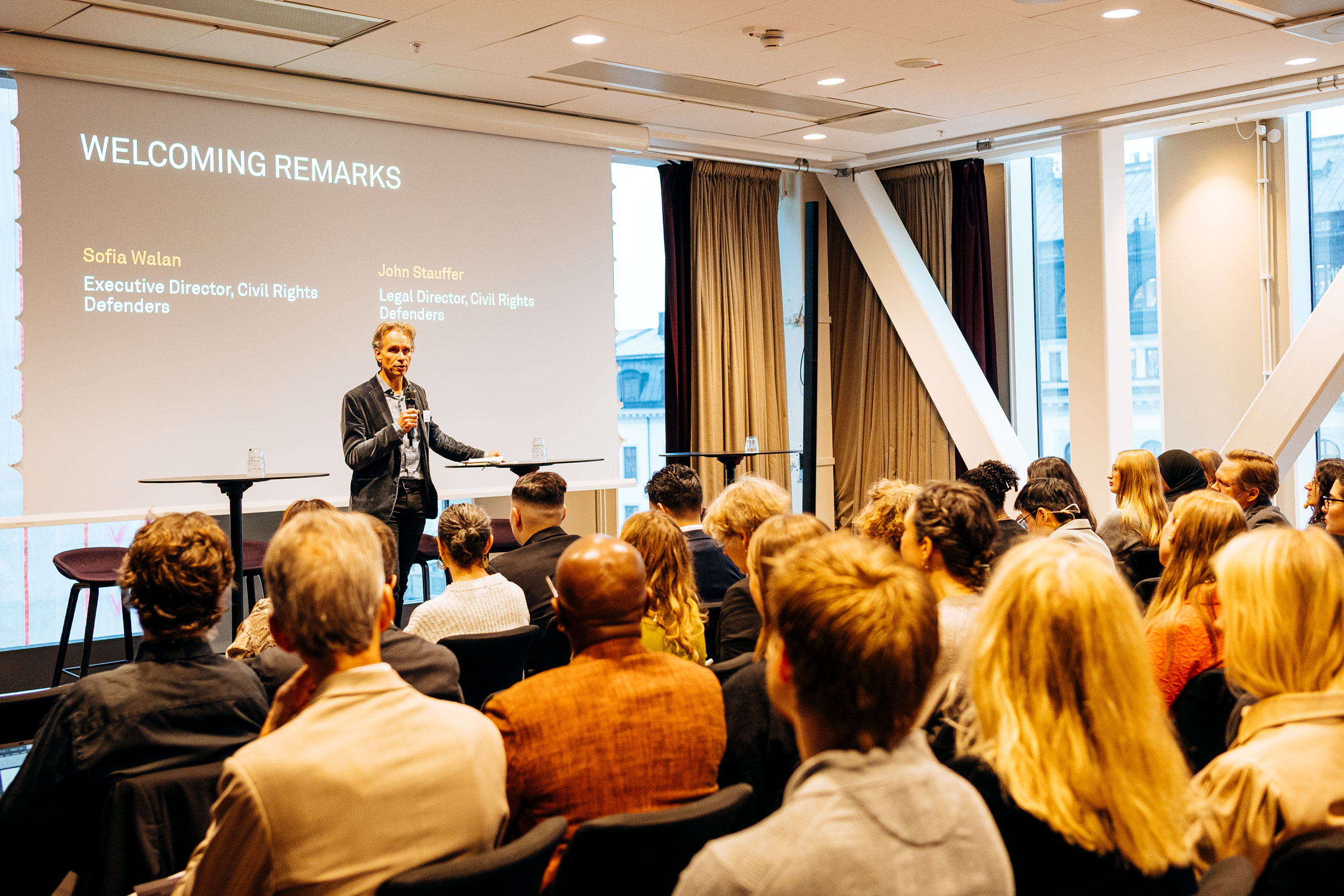Nordic Rule of Law Forum 2025

Rights on the Move – Rule of Law in an Era of Restrictive Migration Policies
5 DECEMBER 2025 – STOCKHOLM, SWEDEN
In a time of accelerating legal and political change, the rule of law in migration governance faces unprecedented strain. Across Europe – and notably within the Nordic region – states are adopting increasingly restrictive measures that challenge long-standing legal safeguards and human rights principles. These developments raise urgent questions about how law is interpreted, justified, and lived in contexts where exclusion becomes policy and control is framed as protection.
This year’s Nordic Rule of Law Forum brings together legal practitioners, judges, scholars, and civil society actors to critically examine the shifting landscape of migration law. Through keynote addresses, expert panels, and lived testimonies, we explore how legal frameworks are used both to uphold and undermine rights, and how institutions and individuals respond to these tensions.
From the strategic use of human rights narratives to legitimize restrictive policies, to the institutional pressures that arise during periods of rapid legal reform, the Forum offers a multidimensional perspective on a legal framework in motion. What does it mean to defend the rule of law when legal safeguards are being redefined? How can legal actors and institutions uphold rights and accountability in increasingly repressive environments?
The 2025 program invites reflection on the restrictive policy reforms taking place on global, European, and Nordic levels, and the possibilities for restoring rights-based approaches within systems under strain. Through dialogue and analysis, we aim to strengthen understanding of how the rule of law can be protected – and reasserted – in the face of systemic change.
PANEL 1: Human Rights Justifications in Restrictive Migration Policies
Across various national contexts in Europe and beyond, we see the expansion of detention regimes, border externalization, and surveillance measures that disproportionately affect migrants and racialized communities. Paradoxically, these policies are often framed as protecting human rights – such as safeguarding children, ensuring public safety, or defending national values – despite their clear rights-infringing effects.
This panel explores how states strategically deploy human rights narratives to legitimize restrictive migration policies. These “human rights justifications” not only distort the protective purpose of human rights law but also complicate efforts by civil society and affected communities to challenge such measures. Understanding how these justifications operate is essential for developing legal, political, and advocacy strategies to resist them.
This session brings together researchers from the EU Commission-funded Horizon project HRJust, coordinated by the University of Gothenburg, to explore how human rights narratives are used to legitimize rights-infringing migration policies. The panel will examine the mechanisms and impacts of these justifications, particularly on migrants and civil society, and discuss strategies for identifying and challenging them.
PANEL 2: Migration Law in Motion – Upholding Rights and Rule of Law in a Changing European Landscape
The upcoming implementation of the EU Pact on Migration and Asylum marks a significant shift in the legal landscape of European migration governance. With new procedures, accelerated timelines, and expanded cooperation with non-EU countries, the Pact raises pressing questions about how legal certainty and fundamental rights will be upheld in practice.
This panel explores how different actors – those interpreting the law, applying it in administrative practice, and advocating for rights protection – navigate the challenges of maintaining legal safeguards during periods of rapid regulatory change. It examines the institutional and normative pressures that arise when legal frameworks evolve quickly, and how these pressures affect access to justice, transparency, and accountability.
Bringing together perspectives from adjudication, administration, and advocacy, the panel will reflect on how legal certainty is understood and defended across different institutional contexts and discuss strategies for reinforcing the rule of law in the implementation of the Pact and beyond.
PANEL 3: Copying Control – Nordic Trends in Restrictive Migration Law
In recent years, Nordic countries have undergone a notable shift in their migration and asylum policies, moving from a tradition of humanitarian leadership toward increasingly restrictive and exclusionary approaches. Rather than promoting progressive reform or evidence-based policymaking, a troubling pattern of repressive inspiration has emerged – evident not only in migration policy but also in criminal justice, where governments emulate each other’s harshest measures, often citing one another as justification for changes that challenge established legal safeguards and human rights principles.
This panel examines the phenomenon of repressive policy transfer within the Nordic region, with Denmark frequently positioned as a model despite widespread criticism and legal challenges surrounding its migration-related reforms. These developments raise serious questions about legal certainty, proportionality, and access to justice for migrants and asylum seekers. What drives Nordic countries to replicate restrictive measures despite their questionable legality and effectiveness? How do these dynamics affect the rule of law, regional cooperation, and the legitimacy of Nordic legal systems?
Bringing together legal scholars, migration experts, and practitioners, the panel will critically assess the consequences of this trend and explore whether there is a path toward restoring legal safeguards and reversing the logic of repressive emulation.
See the full program for Nordic Rule of Law Forum 2025.
This year’s Forum is organized by Civil Rights Defenders and Human Rights Justifications, an EU Commission funded Horizon project coordinated by the University of Gothenburg.




